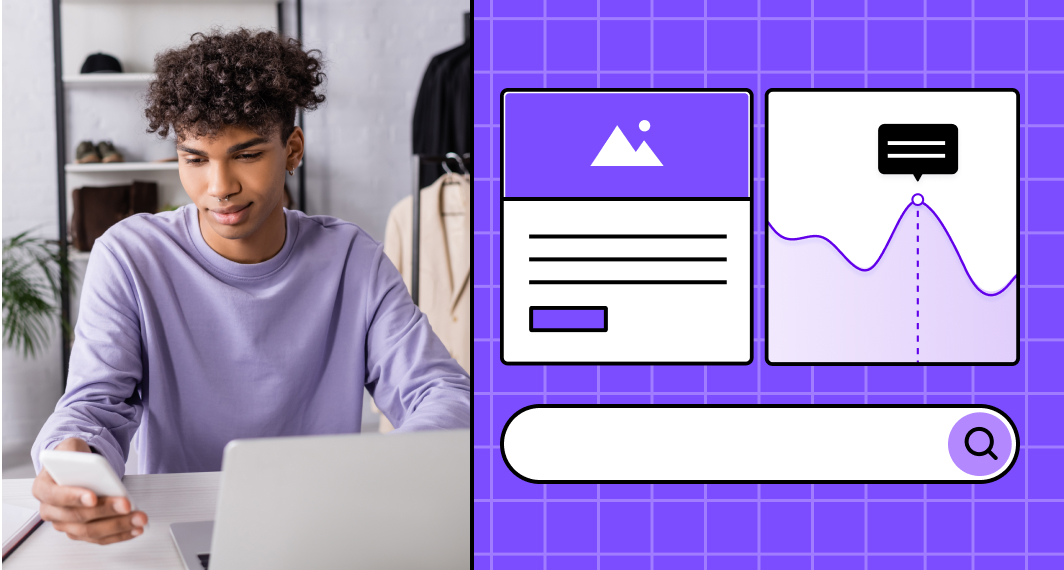What is ecommerce?
Ecommerce is the process of buying and selling products and services online, allowing you to widen your company’s reach, strengthen your brand and, ultimately, maximise profits. By comparison to bricks-and-mortar stores, the startup costs for ecommerce are low, meaning just about anyone can engage in it.
To enable your ecommerce business, you’ll need:
- Digital real estate ,such as a marketplace store, a website or a mobile app
- An effective marketing strategy, including email marketing, social media marketing and other distribution channels.
What are the main types of ecommerce businesses?
There are three main types of ecommerce business. These are:
- Business-to-Consumer (B2C):The likes of Amazon, Zara, and Walmart sell products directly to consumers
- Consumer-to-Consumer (C2C): By contrast, eBay and Craigslist enable consumers to sell to one another, bypassing formal retailers
More niche ecommerce businesses include:
- Consumer-to-Business (C2B): Upwork and Fiverr, for example, allow freelancers to sell their services to businesses through an online marketplace
- Business-to-Government (B2G): Aeroplane manufacturers, for example, may be commissioned by governments to provide military aircraft
- Government-to-Business (G2B): Governments support auctions, tenders and application submission functionalities online, which B2G companies can bid on
- Government-to-Consumer (G2C): Governments provide products or services to end consumers directly, including services like tax filing and passport applications
What are the pros and cons of ecommerce?
There are several benefits to an ecommerce business, but there are also potential cons you should be aware of. These include:
Pros | Cons |
Give customers access to your product catalogues anytime, anywhere | Open yourself up to digital risks like hacking, data breaches and outages |
Reach a global audience and expand your customer base | Experience high return rates due to customers being unable to view and try your products in person |
Benefit from lower overheads than brick-and-mortar stores, including rent and staffing. | Requires efficient logistics and shipping, although this can be mitigated by dropshipping |
Leverage personalised recommendations to improve the customer experience | |
Use customer data to target your advertising and inform future business decisions |
9 industries that use ecommerce to generate business
- Retail businesses use the ecommerce experience to sell consumer goods at scale; Amazon, Walmart, Best Buy, Target, Zara, Nike and ASOS are all examples of this model in action
- Financial services businesses like PayPal, Venmo and Square are all examples of companies that offer online payment processing services online
- Healthcare companies like Teladoc, MDLive and Doctor on Demand are all telemedicine platforms that offer online consultations, treatment, and online medicine delivery
- Construction businesses such as BuildDirect sell building materials and supplies to construction companies online
- Hospitality businesses like Airbnb and VRBO allow people to rent out their homes and sell experiences to travellers
- Education technology platforms like Coursera and Udemy offer online courses and training programs
- Entertainment OTTs like Netflix, Hulu and Amazon Prime Video are all examples of companies that offer streaming services for movies and TV shows
- Online food ordering platforms like Grubhub, Uber Eats and DoorDash allow customers to order food from local restaurants and have it delivered to their doorstep
- Online grocery stores like Instacart and Peapod offer an online market for grocery shopping and home delivery services
Get a free app prototype now!
Bring your software to life in under 10 mins. Zero commitments.

 Facebook
Facebook X
X LinkedIn
LinkedIn YouTube
YouTube Instagram
Instagram RSS
RSS


